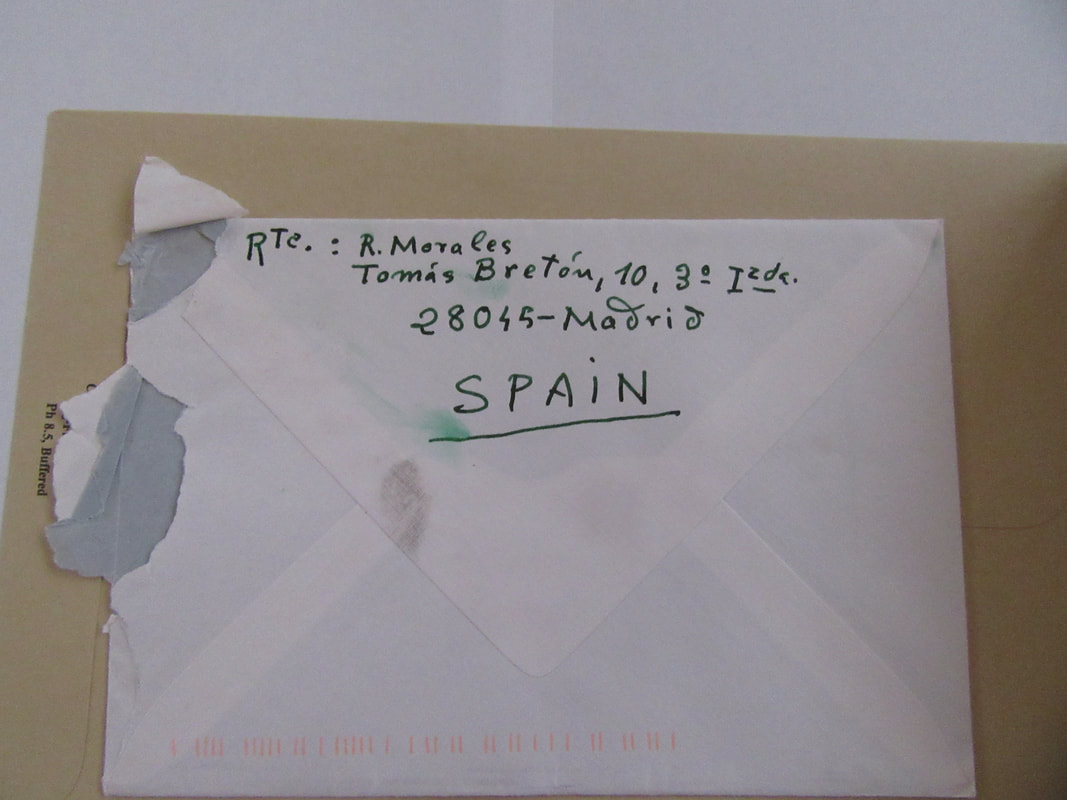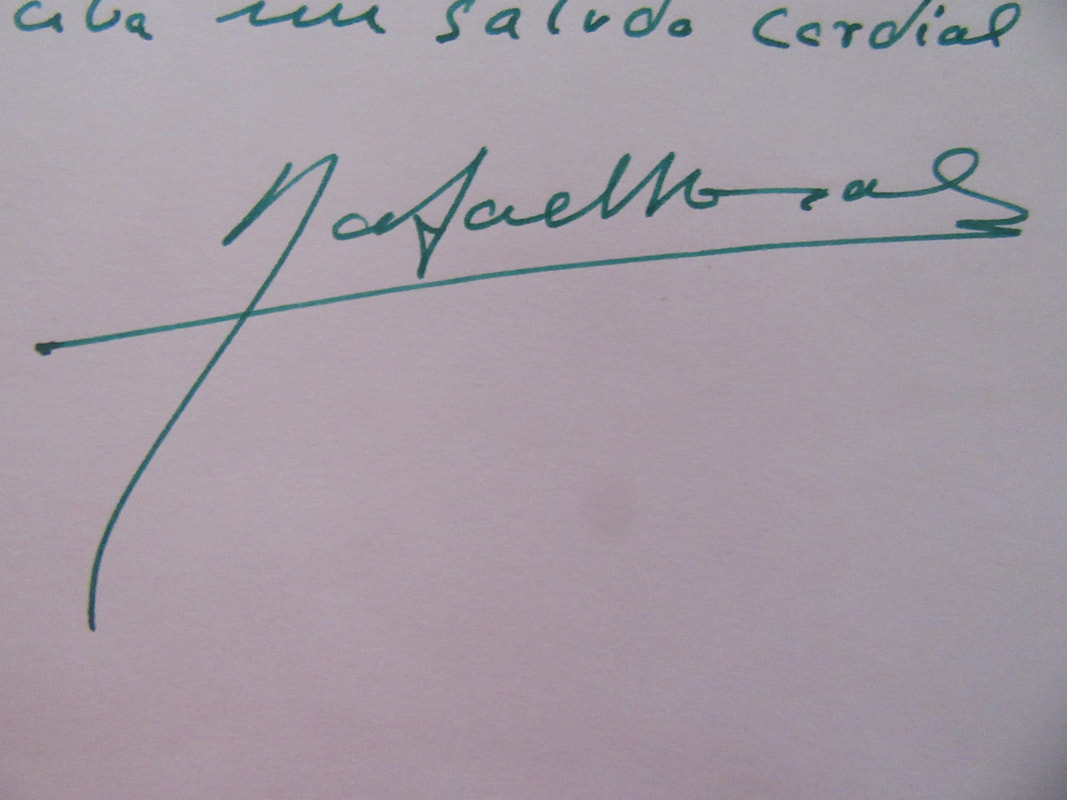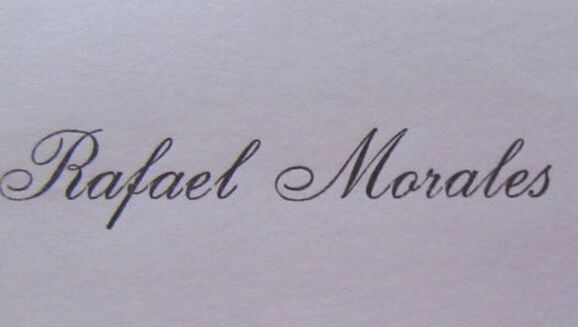Poet
Rafael
Morales
|
Veery: What writers do you respect? Rafael Morales: There are many, but I point out Miguel de Cervantes, who created the modern novel and exalted the greatness of the spirit. And also because in La Galatea, he wrote the following verse: “I was born free, and in freedom I blend.” Veery: Did you have any tough years of trying to make it all work, money, prestige? Rafael Morales: Fortunately, in the literary field, my prestige was great and sudden from the moment I wrote my first book of poems. It is called Poemas del toro (1943). It surprised the critics a lot and the Nobel Prize winner, Vicente Aleixandre, said of it that it was “new in a deep sense.” Indeed, it caused a great influence on the stylistic orientation of the Spanish poetry of the time, according to what the critics say, and my name was included in all the anthologies of Spanish poetry since its publication. As can be seen, my literary life has not gone through many difficulties. In Spain, whenever something was written about bulls, in verse or prose, it was always done from a point of view related to the bullfights or bullrings. But I, who do not like bullfights, talked about the bull not relating it to local color but as a symbol of the Spaniard in the Civil War (1936-1939) and the terrible postwar period, because he, like the bull, was harassed, hurt, maltreated and enclosed by a fence which did not permit him any escape to freedom and life. In my own life, in my being in this world, the possibilities were not as many as in the literary field. When I finished my studies in philology, I had to work in several poorly paid jobs, such as private lessons, writings for the radio or constant collaborations to magazines in order to earn a living. Veery: Do you picture yourself as part of any tradition? Rafael Morales: We are all immersed in a cultural tradition, but I do not belong to any specific school. The specialized critics usually find - especially in my earlier works - the influence of the great Spanish baroque poets such as Lope de Vega, Luis de Góngora y Francisco de Quevedo, something which could be possible. The poets of the twentieth century who I most admire are Rubén Darío, Juan Ramón Jiménez, Pedro Salinas, Gerardo Diego, Vicente Aleixandre, Federico García Lorca, and Pablo Neruda. But these poets, with their stylistic differences, do not belong to a specific school in which I could be inserted. Veery: What disappoints you today about the present literary world? Rafael Morales: I do not know very well the literature from other countries, not even from the Latin-American countries, but as far as Spain is concerned, the most disappointing is the decadence of poetry, which is nowadays falling into prosaism, that is, into the absence of expressive or artistic suggestion. Veery: What's the best thing someone could say about your work? Rafael Morales: This: “Already his first poetry work in the Adonais collection, extremely important in the Spanish lyric, places in an outstanding position the authentic voices, the miracle perfection.” - Roque Esteban Scarpa, Professor of Spanish Literature, University of Santiago de Chile and literary critic. El Mercurio, Santiago de Chile (30.7.1950). "Complete poet, whose collected works place him - or better confirms him - in one of the first positions of the Spanish contemporary poetry." Emilio Miró, Professor of Spanish Literature. School of Philology, Universidad Complutense of Madrid and literary critic. Insula 256 (Marzo,1968). "Rafael Morales has given poetry the dimension and strength of the lasting works.” Miguel Dolç, Professor of the University of Barcelona and literary critic. La Vanguardia, Barcelona (7.11.1968). "Rafael Morales (about Entre tantos adioses, 1993) has written an emotional elegy of life. It is a new, beautiful, sad, elegant and simple modulation of melancholy, which since Jorge Manrique, echoes through the highest peaks of our lyric." - Fernando Lázaro Carreter, Professor of Literary Criticism, Universidad Complutense of Madrid, Director of the Real Academia Española and literary critic. ABC, Madrid (4.9.1993). Veery: What do you look for in a piece of literature? Rafael Morales: The first thing I look for in a work of literature is the emotion of art, that is, expressive emotion, but I wish that this compulsory artistic emotion is settled upon human values and empowered by them. In the literature field, human values by themselves have no meaning, since literature can be art without them, although unfortunately it will be empty. For this reason, I demand art and human values jointly in literature. Veery: As your years in literature accumulate and your experience in the field grows, what becomes more clear to you? Rafael Morales: I know very well that writers can have authentic value or not, but that this is not always what the people perceive. The publicity or the market can alter this reality. We live in a time of great subversion of values. There is a Spanish saying that says “the good cloth is sold in the chest,” but nowadays it would be more correct to say that the poor cloth is the one that sells best if it has good publicity. Veery: Who are your favorite artists and why? Rafael Morales: My favorite artists are Velázquez, Goya, Van Gogh, Monet, and Picasso. Why? I do not know. We never know why we like the sea, the light, the woods . . . . Veery: Is your after hour life tightly linked to literature? Rafael Morales: Life detaches itself from art and presents many other aspects in which the writer has to behave like any other man. Literature, and especially poetry, captivates me, but life is always more captivating. Literature is just an aspect of it. Veery: Literature and social/political concerns. Does one have business with the other? Rafael Morales: In literature everything fits, but with the inescapable condition that it should be treated in an artistic way. So, we should admit in literature the political worries, in the same way as one admits religious, social, or moral ones. Veery: Who are your favorite philosophers and why? Rafael Morales: My philosophical knowledge is not too wide, but I can assure that from the philosophers of the twentieth century who I know best, my favorites are the German Max Scheler and the Spanish José Ortega y Gasset. The former because his thought is centered on life and the ethic of values. The latter because he opposes the vital reason to the Kantian pure reason, and he sees in freedom the fundament of mankind, which is limited by the circumstances. Veery: What makes a writer's career rise? Rafael Morales: Principally his work, although unfortunately this does not mean always quality. Politics, publicity, marketing, often create false values. Veery: To what extent does the press play, general and specific, in the previous question? Rafael Morales: Both the general press and the specialized play a very important role in it. The former spreads the work into a more extensive field of readers, but the latter values the work more in depth. The general press extends the space (more readers) whereas the specialized press deepens in time (projects the writer into the future). Veery: Who are your favorite translators and why? Rafael Morales: I prefer translators loyal to style more than to content. Why? Simply because in a poem the expression is more important. In any case, my ideal is that they should be truthful both to meaning and to form, a very difficult loyalty to achieve. Veery: What do you think about when you look at a blank sheet of paper? Rafael Morales: I always start from an intellectual impulse, from an impression, but I never know how I will end. Poets usually do not know it. Veery: Is one aspect of a literary work the most significant, for example, new content covered over familiar style, or just as well, new style over familiar content? Rafael Morales: I think an original, new, and personal style is the most important aspect, whether the content is new or traditional is something secondary. In any case, the ideal is that style and content are new. Veery: What do you look for in a translator? Rafael Morales: I value accuracy and that the translator considers the artistic importance of the expression. Veery: Would you like to clarify any positions or misconceptions through external sources, people, applied to your work, in a brief way? Rafael Morales: No. I respect all the critical opinions, even the ones I consider mistaken, if they are written with intellectual rightness. Veery: When you started in literature, what did you think of it? What do you think of it now? Rafael Morales: When I started publishing poems I was a teenager of fifteen, with a clear literary vocation which arose with the passion for reading. Writing for me was to free emotions originated by the contemplation of the landscape, by the attraction of a young lady, et cetera. It is obvious that I perceived that writing poetry was an art, but at that time I did not question myself what poetry was about. The pleasure of writing what I felt was what most interested me. Nowadays, I have the same feeling, but I am conscious that what I write should have artistic emotion, and if poetry does not have artistic emotion, then not even the feelings would have a literary meaning. At the beginning, I was worried about the content, now I am more worried about the form. But my idea is the fusion between meaning and form. Veery: What is nature? Rafael Morales: A marvelous and dazzling mystery. Veery 2020, First Published Interview 1998 - 1999, Paper Mail, Rafael Morales in Madrid, Spain |


